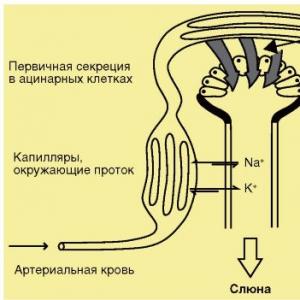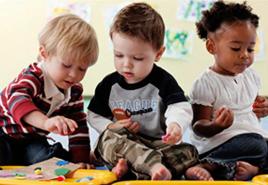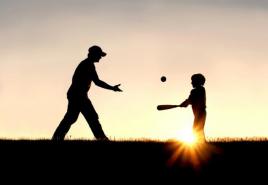Do I need to prepare children for school in the summer. When is it time to start preparing for school? How to prepare for school
So the time has begun to prepare future first-graders for school. Have you already decided on a suitable technique? So much is needed: reading, mathematics, logic, languages \u200b\u200b... And you have enough time for all these activities? And children - do they really need all this now, despite the fact that reading, counting and writing will be taught at school?
Take a moment and try to determine the goal you are striving for when choosing a preschool program for your little one. Will she be able to meet all the needs of a first grader?
Having analyzed the knowledge and skills necessary for a novice student, the following can be distinguished:
- Patience and perseverance, willingness to sit out for half an hour at a desk.
- Ability to use a pen and pencil.
- Developed habits of a healthy lifestyle, sustainable hygiene skills.
- Expression of your own emotions and partial ability to manage them. An active reaction to the emotions of the people around, their correct perception, the difference between positive and negative sides. The presence of a developed imagination, fantasy, an emotional reaction to what he saw or read.
- The use of communication means, both verbal and with the help of facial expressions, intonation and gestures, the ability to conduct a dialogue, communicate not only with peers, but also with adults. The ability to make a request and express thoughts correctly.
- Developed thinking, thanks to which it is possible to study and observe the norms and rules of behavior accepted in society, as well as plan one's own actions to achieve the set goal. Ability to follow instructions, work according to a model.
- A certain level of concentration of attention, allowing to solve problems appropriate to the child's age, a knowledge base for solving emerging problems. Also, the future student must have a large amount of skills that are required for various types of his activities.
- Knowledge of your gender, understanding of family relationships and ties, knowledge of the traditions and values \u200b\u200bof your family. The child knows how to speak his native language and knows his country.
However, even with all this knowledge and skills, there is no guarantee that the first grader will successfully study - both psychological readiness for school and the child's desire to learn new things and gain knowledge are extremely important.
Hence the question: how can you efficiently and effectively prepare a baby for the 1st grade?
And the answer is pretty simple:
Develop your brain!
There is a great way to develop a kid from the age of five and prepare him for school, which will be the basis for any learning - a unique method of training the brain and developing intelligence. And this course is optimal, as it can replace several different techniques!
By training, the child gets an active brain that knows how to learn and allows you to enjoy the learning process itself and enjoy it. After all, it is the fully developed brain of the baby that will give him the opportunity to easily join the school process and cope with educational loads.
Preschool development in Soroban has several advantages:
synchronous development of two hemispheres;
stimulating the growth of new synapses, strengthening neural connections between brain cells;
improvement of creative and cognitive skills.
And all this happens with training in mental counting - a complex mental function.
As a result, Soroban Preschool helps:
- the formation of a positive attitude towards school and understanding of the educational process;
- development of logic, memory and thinking, concentration and attention;
- mental and intellectual development;
- developing communication skills, getting rid of the fear of being in a team;
- the emergence of self-confidence.
Soroban School of Oral Counting is a leader in intelligence development technologies.
Only here you get a trial month to get acquainted with this unique technique. Come, we are looking forward to your baby at our school!
The earlier the preparation of the child for school begins, the more successful the entry into the new school life of the future first grader will be. It is advisable to start psychologically preparing the child for school as early as 3-4 years old, when the perception of the world is already sufficiently conscious and at the same time the child is more open to everything new than ever, tries to imitate adults, to do "like mom and dad. During this period, modeling classes are perfect - the development of hand motor skills affects the formation of intelligence, exercises for concentration and memory development - learn poetry, tell fairy tales, sing songs - the main thing is that the child is interested in studying. These lessons will remain in his memory for the rest of his life, and the formed association “activities are interesting” will do good service more than once.
The meaning of the game
By school age, the child must learn to follow certain rules of behavior in society. The process of general games contributes most of all to this. Gradually, the child will learn to restrain himself and his impulses and will begin to act "as it should", taking into account the interests of other children, because there is nothing worse for a child than not being accepted into the game. Parents, on the other hand, should not constantly interfere with the child's play, defending the mistakes and miscalculations of their baby.
One hundred thousand why
A child must be curious enough to be successful in school. How can this be achieved? Do not dismiss the constant questions of the baby, which sometimes so annoy parents. After all, your answers are almost the only source of information for a little why. Take your time for detailed and benevolent answers and, perhaps, your child will become a great scientist.
Study motivation
Another difficult moment in preparing a child for school is developing the right attitude towards learning. The kid should, at his own childish level, understand well why he has to go to school. The seriousness and responsibility of a young student largely depends on the position of parents and other close relatives. Of course, for a child, school is not only about learning. These are meetings with friends, fun breaks, holidays. And yet he will be sure that his studies are very important if all members of his family become sincerely interested in his successes and failures, "root" for his school affairs.
Regime of the day and the formation of responsibility
The habit of following the correct daily routine is instilled from the very first days of school. It is at this time that basic ideas about how the working day should go is laid and formed in the child. Yes, it is a worker - after all, for your baby, studying is the same job, so he should get used to treat it as responsibly as mom and dad treat their work responsibilities. This means that it is worth teaching a child a lesson from childhood not to be late for classes, always carry out even small tasks of the teacher, show responsibility, be attentive and collected. Well, it is not easy for a newly-made first grader to meet all these requirements! Do not overload your child with all kinds of circles, especially in the first months of school. The correct ratio of work and rest is necessary for the painless adaptation of the baby in a new school environment for him.
Don't expect your first grader to only carry home A's. Remember: your relationship with your child, your joint efforts to make your studies more successful, is much more important than any grade.
In this article:
A person is so arranged that his own child seems to him the most intelligent, talented and beautiful. There is only one problem: neither the examiners nor the teachers at school know about it. They are only interested in numbers, letters, pictures and missing elements. And these insensitive blockheads will never understand that right now they are seeing the best child in the world.
Preparing children in general and each kid separately for school is the only thing that fits in their head. At the same time, they poke around in children's heads, hacking the parental brain, boiling with indignation every time a child is asked something out of the ordinary. To prevent this from happening to you and your little one, we suggest preparing in advance for the execution called "testing of preschoolers."
Preparing for school and its meaning
Whether it makes sense in preparing a child for testing is up to the parents to decide. In principle, a child goes to school in order to study, and does not study at home to get to school. However, this can only work with regular schools. If your ambitions and desires push you into the arms of a more highly specialized or elite educational institution, you will have to "sweat" a lot to adjust the knowledge of the little one to  appropriate level.
appropriate level.
Everything was easier before. Children were sent to study at a nearby school. At the same time, no one passed any entrance exams. In the course of training, children received a fairly high average level of education and entered the institute. Today, things are a little different. The development of the education system requires responsive development from children, which is not given in preschool, which means that they have to study at home.
Thus, preparation for school falls on the shoulders of the parents, as well as the responsibility for the absence thereof. Therefore, when you exclaim “You don’t teach your child English, mathematics, computer science and other subjects? Oh no no no! Aren't you ashamed? He's a complete zero! " parents blush to the roots of their hair and do not know what to do with themselves. And nothing that this "zero" is still five years old, and he already has to put a huge informational load, which also requires a strict regime that deprives the baby of childhood.
Does this bother you? And not strange. Most modern parents are normal about such an excessive load on the child. At the same time, forgetting about what their childhood was like. But many argue that the best! There was no Internet, computers and tablets, and the children spent all their time on the street. But today, it is the parents who keep their children within four walls and put them on all kinds of gadgets. 
First, a lot of useful information and lessons on all kinds of developmental systems are uploaded to them. Secondly, the child is at home, before our eyes. Thirdly, the development of the baby must correspond to the development of peers and their interests, so that he does not look like a “loser” against the background of others. All this is taken as weighty arguments, and the street with its entertainment and broken knees remains outside the window, and the reflection of the switched on gadget flickers in it, in which the toddler, twisted into three deaths, dissolves, spoiling his eyesight and posture ...
Only adults understand the value of education. Children "sit out" their term in the chosen educational institution. At the same time, parents invest in their studies not only strength and personal time, but also significant finances. What follows from this? That the child should be interested. Even if you plan to start learning even before the baby goes to first grade, do it in a fun, interesting, playful way and in an informal setting.
Preparing for first grade in advance
Preparing for school is important, difficult and boring. As mentioned above, it needs to be lightened and "amused". It is best to start developing primary knowledge and skills a year before school. It makes no sense before: the child will learn too much, and then he will be bored in the classroom,  which can discourage learning at all. And later classes will not have time to give the required result.
which can discourage learning at all. And later classes will not have time to give the required result.
If the school is not chosen, then it is also better to choose a year before the start of training. Don't dwell on one option. Better to pick at least five. But first you need to decide on the profile of the future education of the toddler. Have you chosen? Now pick up schools. Why are there so many options? Then, in the end, several of them may not suit you, in a couple - you and the child will not suit, but one of them will be perfect.
When choosing a school, you should also understand who you want to raise your child. By the way, don't forget to ask him too. However, the makings of a baby can tell the most. The more precise the task, the easier it is to choose an educational institution.
Another argument in favor of choosing a school early is  these are preparatory courses. They are conducted on the basis of schools. Often, these same classes are accepted by children who will subsequently study at this school.
these are preparatory courses. They are conducted on the basis of schools. Often, these same classes are accepted by children who will subsequently study at this school.
How do you know if a particular school has preparatory courses? Simply by calling the director's reception or visiting the institution's website. Most schools have long been "modernized" and acquired their own Internet sites. Also, the site will allow you to evaluate the school from the outside. Photo albums, reports on events, work done and other materials posted on the Internet portal will tell a lot.
Preparation for the school testing program
Our grandmothers believed that in order to develop mathematical abilities in children, we should play chess with them. However, this is not quite true. If you want your child to learn to solve  problems - solve problems, read - read, sing - sing, draw - draw. After all, what cannot be measured simply does not exist!
problems - solve problems, read - read, sing - sing, draw - draw. After all, what cannot be measured simply does not exist!
Prepare for school according to its own requirements, tests, assignments, specific examples of questions. Abstract preparation requires too much material that the child simply cannot learn. And there is no need!
Where can you find these tasks? The easiest way is to get it from the admissions office. If you were refused there, ask around the parents of the first graders. Didn't find those? Then study the materials from the textbooks for first graders, which are studied in the chosen school. The ideal future first grader should know and be able to do everything that he will be taught during the first academic year.
What exactly? Here is a list of the basic skills and abilities of preschoolers:

If the school recommends not teaching the child to read and write, they say, they will teach themselves, then most often this is a provocation. At the interview, the child will still be asked to write, and count, and solve not only a problem, but also a logical task.
In general, everything is clear, but what exactly do you need to enter school?
So, you are the parents of a future first grader. You stand at a crossroads, because you cannot understand what specific skills to develop, what to study, in which direction to move. Experts recommend focusing on the following skill categories:
- Logics.
The child should be able to classify objects, combine them into groups, exclude unnecessary ones, find differences.
- Arithmetic.
The kid should be trained in counting, addition, subtraction, number composition, more / less concepts.
- General erudition.
This includes knowing the last name, first name, patronymic, address, country and city of residence, capital, nearby or main river. Also, the development of a child involves the study of the seasons, months, the date of his own birth ...
- Fine motor skills.
Writing, rewriting the text in capital letters, sketching a picture.
- Speech.
This is something with which most children have a big and serious problem that does not go away even during schooling. So, the baby should be able to retell the simplest stories, fairy tales, stories.
- Memory.
The best development of this skill is playing with pictures. Let the child look at the image for a few minutes, then tell what was depicted on it - down to small details.
- Attention, observation.
You can develop in the same way as memory. However, this is not always interesting and fun.
Developing any of these skills can be more fun. For example, while walking, you can count the red cars encountered along the route. Firstly, this is how the child will learn counting, because machines must be counted. Secondly, mindfulness will develop: you only need red cars. Thirdly, you should remember  the number of passing red cars - thus training memory.
the number of passing red cars - thus training memory.
What else can be considered? Steps, dogs, cats, girls with bows. And you can also describe in words everything that happens around. Come up with reasons why this aunt looks so sad and why the toothless boy in the shop window is so happy. Imagine, play with your child. And then any activity will be interesting, and any information is easy to remember. But the most important thing is that the child will enjoy learning, as a result of which the first of September will not start with tears and whims, because it will be the first day of a new life - full of cognitive adventures.
Developing children at home: what is needed for this?
Many parents today doubt to the last whether preschoolers need home preparation. This issue is especially acute among those who studied during the Soviet era. Most of all, grandmothers complain about learning, development and work at home. They feel sorry for their grandchildren, especially since they did not torture and do not burden their own children so much, who at the same time managed to break out "into the people". Why is everything different today? How does competition influence the formation of a child? And why at this age does the baby have to compete with anyone? They don't know it. And if some are simply lamenting the imperfection of modern education, others leaf through site after site in search of relevant information that  will make life easier for the future first grader and relieve him of stress during an interview at school.
will make life easier for the future first grader and relieve him of stress during an interview at school.
Previously, only elementary skills were taken into account when preparing for school. The current school curriculum is designed for a higher basic level. Agree, children today know much more parents at the same age. Why, then, should they be taught the same way? After all, they, due to different conditions of life and development, are much smarter! Their brains are more active and their abilities are more developed. This means that children are more perfect. That is, you can invest more in them and get more in return.
It is up to the parents to decide who will be involved in this "investment". You can turn to professionals. But you can prepare your own child yourself. Houses and walls help. And together with mom or dad and knee-deep sea!
Visual aids and tips are all you need to develop skills
In order to prepare for entering school, it is best to use a certain material base. It can be purchased. So, training materials are freely available in bookstores and online stores. Suitable  the site is easy to find upon request, and then choose the necessary benefits and order with home delivery.
the site is easy to find upon request, and then choose the necessary benefits and order with home delivery.
For those who are not looking for easy ways, but, on the contrary, are looking for reasons to spend time with their child and learn while playing, we offer the following. Make such materials and tips yourself. You can either copy the templates available on the Internet, or come up with your own. Going to any site aimed at the development of preschool and school children, you can find a lot of information and even ready-made layouts with illustrations for classes that you just have to print out.
What are these materials? For example, posters. So, the seasons can be studied from a round poster made in the form of a sun, part of which smiles, cries, freezes and runs in streams. At the same time, a smile is summer, tears are a symbol of rains and autumn, cold, which can be designated with a warm hat, is winter, and streams are spring. Every season you can  conditionally divide into months, not forgetting to finish drawing the picture-association. So, September can be designated by a school bell, October - a mushroom, November - a yellow leaf, December - a snowflake, January - a Christmas tree, February - frosty windows, March - a snowdrop, April - streams, May - a backpack, and June, July and August for a nursery a cheerful little face against the background of the sea, seagulls and the sun.
conditionally divide into months, not forgetting to finish drawing the picture-association. So, September can be designated by a school bell, October - a mushroom, November - a yellow leaf, December - a snowflake, January - a Christmas tree, February - frosty windows, March - a snowdrop, April - streams, May - a backpack, and June, July and August for a nursery a cheerful little face against the background of the sea, seagulls and the sun.
There are many options for benefits. All of them can be done with your own hands, involving the child in the work. In this case, you will have to explain less what this or that picture means. You just have to consolidate the passed material.
In addition to all of the above, parents involved in child development should consider the following points:

It is better to go to the exams, tests and interviews themselves in high spirits. If the parents are in a fever, this does not mean that the child should feel the same. Try to make this day as simple and ordinary, and then the baby will easily answer all the questions. Seeing that mom and dad are nervous and consider this day special, the baby may be afraid to ruin it, and because of fear it will close, and all knowledge will simply get confused in his head
Know: you did your best! The rest must be done by the teachers during the course of the training. And if you don't pass your first interview, don't worry. Let those who did not get the best child and the most capable student - your future first grader - worry!
Good afternoon, dear parents. It's time to get ready for school and prepare your lessons! As soon as the child turns 4-5 years old, parents begin to think about what kind of preparation the child will go to school with, with which education bias to choose, to which teacher to go to class. ...
And the closer this "cherished" age, the more restless it becomes in the soul. In advance, select clothes, office supplies, schoolbags or backpacks in a large assortment offered by the online store of backpacks and bags "Rukzachok".
At what age to send a child to school
First of all, it is worth deciding at what age you want to send your son or daughter to school. The "foreign boom" for 20 years has already passed, when everyone tried to send the child to study almost from the age of 5, and now the "fashion trend" is the opposite - the later the child goes, the better.
More and more often you hear from parents that the student is still small, that it is too early to study, that he is not yet ready for lessons, for homework. There is a grain of reason in this.
The difference between a 6 year old and a 7 year old in school is enormous.
And she will begin to level out only in high school. So take your time to become adults. Or then you will repost anecdotes about teachers and vacations on social networks with a manic enthusiasm.
How, yes, so that he does not look like a complete loser against the background of his classmates and does not yawn in class because he already knows everything?

Time to get ready for school
Of course, you must have a certain amount of knowledge before school. And it will be easier for the child to join the team, and the parents will save their nerves, and the teachers will have room for activity.
Ideally, a kindergarten with its own specialists who know what knowledge needs to be given to children, what they should be able to, who work with children in a team and in conditions close to school.
You can hire a tutor. As a rule, these are primary school teachers who are familiar with the school curriculum and requirements. Of course it's not free. And you will have to part with a certain amount.
And you can work with your child at home. There are a lot of tips and tricks on the Internet on how, when and what to tell your son or daughter. In this case, you will have to waste your time and nerves a little. Or maybe not slightly. The main thing is to do it in a playful way.
 The most important thing is to take your time to get quick results. Do not try to set deadlines for studying letters or invoices. Any result is not a reason to be nervous and upset. It worked out - be proud, it didn't work out - there is time to fix everything.
The most important thing is to take your time to get quick results. Do not try to set deadlines for studying letters or invoices. Any result is not a reason to be nervous and upset. It worked out - be proud, it didn't work out - there is time to fix everything.
You should not put pressure on the kid, force him to do something through force. Try to explain the importance of what he is doing.
Buy the kid some "significant" thing for him that schoolchildren have:
- a beautiful backpack, like a neighbor's boy - a schoolboy,
- notepad or pen,
- a watch with numbers is great.
There will be a reason not only to learn numbers, but also to learn to understand time.
Talk to the preschooler, tell, read. If the kid is interested in dinosaurs or planets, cultivate his interest, warm it up with different facts and carefully deduce the knowledge that he will need.
Discuss with the preschooler what he understood from the cartoon he watched, ask him to retell the fairy tale that dad read to him, tell him about a trip to nature with his grandfather. Have a conversation.
The more the kid talks, the easier it will be at school!
Draw, decorate, make appliques and crafts with your baby. Teach the basics of safety, develop perseverance and fine motor skills.
It's time to get ready for school! Give your future student more time, love him, be proud of him and you will not have global problems in the class. Well, not with global ones, we can handle it.
Until September 1, it would seem, is still far away. But many parents are already beginning to prepare their child for entering the first grade. This desire is reinforced by the unspoken opinion that the more knowledge a child has, the better. In turn, schools actively support this commitment of parents. They simply refuse to take children who do not know how to read, write and count well.
At the same time, experts warn: for a child, it is not so much erudition that is important as health and psychological attitude to study - children are often tired of “gnawing the granite of science” because of fatigue and high demands. We decided to figure out how best to approach the issue of preparing children for school, and what nuances of the psychology of the kid need to be taken into account.
We take all responsibility into our own hands
Psychologists say that school readiness is a certain social, physical and neuropsychological level of a child's development. In order for a first grader to enjoy learning, he must be relatively independent, speak clearly and quickly, and have at least a minimal amount of knowledge.
Many mothers complain that even in ordinary schools, children are put forward very serious requirements, and when they enter the first grade of an ordinary district secondary school, they have to pass exams. Although, according to the law, this is arbitrariness, which can and should be fought against. Let us remind you: in the fall of 2011, the parliament banned checking the level of knowledge during the admission of children to schools. The MPs then said that testing is often used by the school administration as an excuse to demand money from parents.
According to the director of the Boryspil secondary school No. 6 of I-III degree of accreditation Vera Mazura, boys and girls should be admitted to a regular school only on the basis of a conversation with a psychologist.
Certain tests can be carried out in gymnasiums or in specialized schools. There, as a rule, they demand that children be able to read a little and count to at least ten. “But secondary schools do not conduct any tests. The psychologist talks to the child and asks him simple questions. For example, you need to think out the sentence: "They live in the forest ...". Such questions will help to determine the level of logical thinking of a preschooler and his psychological attitude, ”notes Mazura.
However, Vera Ivanovna emphasizes that you need to start teaching kids long before school, because they have a very "grasping" memory. The teacher recommends that parents not miss the right moment and begin to gradually develop thinking and expand the knowledge of their baby.
Moms say
The mother of 7-year-old Stas, Irina, recalls that her son already knew the letters when he entered school, but he could not yet put them into syllables and read the whole words. She taught him the alphabet herself, as well as the count to ten. Irina is sure that she would not want her son to attend special preparatory institutions before school. “Why then school? What will he do there? After all, there is no norm that would oblige to take to school only those children who can read and count well, so that the level of development of children in the classroom was approximately the same, ”she complains.
“We did not visit children's clubs, where they help in preparing for school, we ourselves and my husband taught our son to read and write. Preparatory classes were offered to us at the gymnasium, to which we are going to go on September 1st. They are free for us, since my son is already on the lists of first-graders in 2012-2013. a specific school, ”says the mother of 6-year-old Mark Eugene. At the same time, Evgenia is against unnecessary "overloads" for her son, she fears that because of them he may not like to learn new things.
And the parents' fears are not unfounded. So, the mother of two daughters Julia found out from her own experience that too high a level of development sometimes interferes with a child in the first grade. “By the time my eldest was in first grade, she could already read, write, count, and speak English. When she entered school, she passed difficult tests without any problems. The teachers praised her very much. And in September, they began to teach my daughter as a child who can neither write nor read. The tasks were on the level - to learn how to write sticks exactly. Of course, she quickly got bored with such science, ”says Julia. She emphasizes that when entering first grade, you do not need to chase the requirements of the school in which you want to enroll your child. Julia was convinced of this by the example of her youngest daughter. “The younger was prepared differently: to read syllables, to count a little. And now she is interested in school. She learns with pleasure! " - says mom.
For help from a specialist
If your child goes this year "for the first time in the first grade", and you absolutely do not have enough time to prepare him, and grandmothers are far away, you can contact the kids club. Although some parents have been taking their children to such institutions since the moment when the kids just learned to walk.
To prepare specifically for school, clubs offer, as a rule, a standard "set" of classes. This is acquaintance with the outside world, mathematics, development of speech, reading, preparation of the hand for writing, English, music, choreography, creativity. “All such institutions are commercial. General education schools do not provide such services, ”says Vera Mazura. Education in children's clubs costs differently, but parents will have to pay at least 300 UAH per month for 4 lessons. I am glad that in children's clubs you can only pay for a trial lesson to begin with in order to assess the reaction of your child, and to get acquainted with the teaching methods yourself.
It happens that caring dads and mothers decide to hire a home tutor for their preschooler. For an hour of their lessons, teachers take from 100 UAH. If with departure to your home - from 150 UAH. The duration of an individual lesson is usually 45 minutes - 1 hour. A "side" effect of such preschool education can be a non-standard approach of teachers. “It happens that the parents were“ reinsured ”and hired a teacher for the kid, who turned out to be either not very qualified or an innovator who completely rejects the standard program. After such classes, the child comes to school on September 1 and it turns out that he needs to be retrained, which is the worst, ”the school director complains.
Psychological aspect
Experts say: if your child can read at least a little and count to ten, it will be easier for him to study in the first grade. After all, such prepared children already understand the learning process itself and are ready to perceive new information, "hold" attention. However, knowledge is not the only thing that a child who goes to first grade needs. A preschooler must be psychologically ready for school.
A qualified psychologist, communicating with the baby, can already at the first lesson find out whether the child wants to make contact, whether he has social adaptation. Psychological readiness for school includes several components. The first is called motivational readiness. It means a positive attitude towards school and a desire to learn, a desire to take a new social position - to become a schoolboy. Another component is mental or cognitive readiness - a sufficient level of development of thinking, memory and other cognitive processes, the presence of a certain stock of knowledge and skills. There is also volitional readiness, which demonstrates a fairly high level of voluntary behavior development. Psychologists also note communicative readiness, which indicates the ability to establish relationships with peers, readiness for joint activities and attitude towards an adult as a teacher.
“In most cases, preschoolers are prepared for the school year by their parents and grandparents. On average, for 30 children in a class, as a rule, 4-5 people can neither read nor count, ”says Vera Mazura. According to the headmaster, these children are from not very prosperous families. These kids have a hard time in the first year of school. It is difficult for them to enter the learning process, as well as psychologically adapt to it. Therefore, sometimes parents of children with psychological unreadiness are advised to wait another year with school.
“Sometimes children not only from disadvantaged families are not psychologically ready for school. Now there are more children with hyperactivity and attention deficit. Such a child, as a rule, is very smart, they say about him that he "grasps everything on the fly." But he cannot hold attention for a long time. He needs a special approach when he goes to first grade. It falls on the shoulders of his teacher, ”says the school director. According to Mazura, attention-deficit children often need one-on-one tutoring because the hyperactive child finds it difficult to concentrate in class and does not listen to the teacher.
Everything is good in moderation
It happens that a child has passed his first interview without any problems. He is ready to learn and communicate with a new team for him. But parents need to carefully monitor the preschooler's motivation. “A problem for a child can be the desire of his parents to“ load ”their child with science from all sides. It is important not to overdo it in this matter, ”says the headmaster. After all, the child, whom the parents decided to prepare very carefully for school, begins to get very tired. And as a result, he loses all desire to study.
“More experienced parents usually don't want to overload their children. One of the parents once even made a small experiment: his child willingly studied English. Dad decided to "plug in" French as well. The child's interest in learning immediately dropped, after which the experiment was quickly completed, ”notes Mazura.
Psychologists focus the attention of parents on the fact that they do not overload their children in any way. Otherwise, “the spring can burst”: the child begins to resist the learning process, often gets distracted. Sometimes interest in learning can completely disappear. It is bad if this happened already in the elementary grades, when the educational process had just begun. But it will be very difficult to return motivation to the child so that he "fired up" with studies again.
According to psychologists, mom and dad should, of course, study and learn the basics of science with the child. A common pastime will strengthen family ties and convince the baby that he is deeply loved and given enough attention. However, parents need to consider the workload when teaching their child. A child should want to learn, and not think that "now the first grade at school is like an institute."
There are more and more first graders
According to the Department of General Secondary and Preschool Education of the Ministry, the number of first-graders in Ukraine has been increasing annually since 2007-2008. This year, according to forecasts, 430.1 thousand children will go to first grade across the country. This is 16 thousand more than in the past. In the capital alone, on September 1, about 27.2 thousand kids will sit down at their desks for the first time. We hope that all of them will love the school and enjoy learning!







